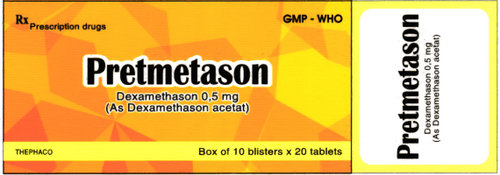This is an automatically translated article.
The article is written by Assoc. Prof. TS.BS Le Ngoc Hung, Dean and Doctor Bui Thi Hong Khang - Laboratory Department - Vinmec Central Park International General Hospital.
Erythrocyte sedimentation test can be used to monitor inflammation. Your doctor will combine the results of the erythrocyte sedimentation test with the results of other tests to build a diagnosis.
1. What is a erythrocyte sedimentation rate test?
The erythrocyte sedimentation rate test is sometimes called the erythrocyte sedimentation rate test. This test is not intended to diagnose a specific disease. In fact, this test helps medical staff determine if you have inflammation.
2. Why did the doctor order a erythrocyte sedimentation test?
When you are in an inflammatory state, your red blood cells easily stick together to form clusters. This clustering effect changes the rate at which red blood cells settle in the test tube. The faster the rate, the more blood cells sink to the bottom of the test tube, indicating that the inflammation is more certain.
This test, in general, can confirm and measure inflammation in your body. However, this test gives no signal as to the cause of the inflammation. Therefore, erythrocyte sedimentation testing is rarely indicated alone. In contrast, doctors often combine this test with other tests to determine the cause of the disease.
The erythrocyte sedimentation rate test is usually ordered by the doctor in the following cases of inflammatory diseases: autoimmune diseases, cancer, infections, rheumatoid arthritis, systemic lupus erythematosus, various forms of arthritis, some types of arthritis. muscle or connective tissue disease (polymyalgia rheumatica), inflammatory bowel disease ...

Người bệnh viêm khớp được chỉ định xét nghiệm máu lắng
3. Clinical signs suggest that you should have a erythrocyte sedimentation rate test
You may need an erythrocyte sedimentation test if you have symptoms of an inflammatory condition such as arthritis or gastrointestinal inflammation. Symptoms may be as follows:
Joint pain or stiffness that persists for more than 30 minutes in the morning
Headache, especially with shoulder pain, Abnormal weight loss, Pain in the shoulder, neck, and hip area Gastrointestinal symptoms such as: diarrhea, fever, blood in the stool, unusual abdominal pain.
4. Prepare for the erythrocyte sedimentation test
Very little preparation is required for the erythrocyte sedimentation test. However, you should inform your doctor about the medications you are taking. Your doctor may ask you to stop taking your medicine before the test. Some medications can affect the erythrocyte sedimentation rate.

Bác sĩ sẽ lưu ý một số vấn đề trước khi làm xét nghiệm máu lắng
5. How is the erythrocyte sedimentation test performed?
This test simply takes a venous blood sample, approximately 2ml, contained in an EDTA tube.
The blood sample is sent to the laboratory, and transferred to a small, long tube, left to settle under gravity for 1 hour. During and after 1 hour, the laboratory staff will evaluate the level of red blood cells in the test tube.
Inflammation causes abnormal proteins in your blood. The protein abnormality makes it easier for red blood cells to clump together. This problem causes red blood cells to settle faster.
Your doctor may also order a C-reactive protein (CRP) test at the same time as the erythrocyte sedimentation test. The CRP test also measures inflammation, but can predict whether you have coronary heart disease or other cardiovascular conditions.
The erythrocyte sedimentation test is usually done by the Westergren method. Blood was added to the Westergren-Katz tube up to the 200 mm mark. Tube was left to stand at room temperature for 1 hour. The distance from the top of the blood mixture and the top of the settled red blood cells is measured.

Lấy mẫu máu làm xét nghiệm máu
6. Normal value of erythrocyte sedimentation test
The erythrocyte sedimentation test is usually measured in millimeters per hour (mm/hr).
Normal values are as follows:
| Phụ nữ dưới 50 tuổi | 0 – 20 mm/hr |
| Nam dưới 50 tuổi | 0 – 15 mm/hr |
| Phụ nữ >= 50 tuổi | 0 – 30 mm/hr |
| Nam >= 50 tuổi | 0 – 20 mm/hr |
| Trẻ em | 0 – 10 mm/hr |
7. Analysis of abnormal values of erythrocytes
An abnormal value of the erythrocyte sedimentation rate does not indicate any disease. It only shows inflammation in the body and points to the need for other tests.
This test is not always significant. Several factors can alter the results such as: older age, medication use, pregnancy.
Some causes of abnormal erythrocyte sedimentation rate are more important than others, but in most cases they are not strongly associated. It is essential not to be overly concerned when the erythrocyte sedimentation test results are abnormal.
On the contrary, work with your doctor to jointly find the cause of your symptoms. Your doctor will usually do more tests if your erythrocyte sedimentation rate is too high or too low.

Xét nghiệm máu lắng cần được thực hiện tại cơ sở y tế uy tín với trang thiết bị hiện đại
8. Causes of high erythrocyte sedimentation rate
There are many causes as follows: older age, pregnancy, obesity, anemia, kidney disease, thyroid disease, several types of cancer including lymphoma or multiple myeloma (multiple myeloma) myeloma).
A highly abnormal result may indicate the presence of malignancy, especially if there is no clinical manifestation of inflammation.
8.1 Autoimmune diseases Erythrocyte sedimentation rate may be abnormally high due to the following autoimmune diseases; systemic lupus erythematosus, certain types of arthritis (including rheumatoid arthritis), Waldenstrom's macroglobulinaemia, transient arthritis, polymyalgia rheumatica, hyperfibrinogenemia, allergic or necrotizing vasculitis death.
8.2 Infections Some infections cause an elevation of the erythrocyte sedimentation rate: bone infections, myocarditis, pericarditis, endocarditis (inflammation of the thin membrane inside the heart, which can include heart valves), arthritis, skin infections, systemic infections, tuberculosis.
9. Causes of decreased erythrocyte sedimentation rate
Low erythrocyte sedimentation rate can be caused by: heart failure, decreased fibrinogen in the blood, decreased blood protein (in liver and kidney disease), leukocytosis, increased red blood cells...

Suy tim có thể làm tốc độ máu lắng thấp
10. Post-processing of test results
Depending on your test results, your doctor may add other tests, including a second erythrocyte sedimentation test, to confirm the status of the first result. These additional results help your doctor map out the specific cause of your inflammation.
If you have one of the conditions listed below, other tests can help measure the effectiveness of your treatment and follow up with an erythrocyte sedimentation test during your treatment.
Underlying medical conditions
If your doctor suspects that you have an underlying condition that causes an elevated erythrocyte sedimentation rate, you will be referred to specialists for proper diagnosis and treatment.
Inflammation
If your doctor finds you have inflammation, you may be treated as follows: non-steroidal anti-inflammatory drugs; or corticosteroid therapy to reduce inflammation.
Infection
If an infection is the cause of the inflammation, your doctor will prescribe antibiotics for you.
Vinmec International General Hospital is one of the hospitals that not only ensures professional quality with a team of leading medical doctors, modern equipment and technology, but also stands out for its examination and consultation services. comprehensive and professional medical consultation and treatment; civilized, polite, safe and sterile medical examination and treatment space. Customers when choosing to perform tests here can be completely assured of the accuracy of test results.
Customers can directly go to Vinmec Health system nationwide to visit or contact the hotline here for support.
MORE:
What is the erythrocyte sedimentation rate test for? What diseases can blood tests indicate? Things to know about blood count test













